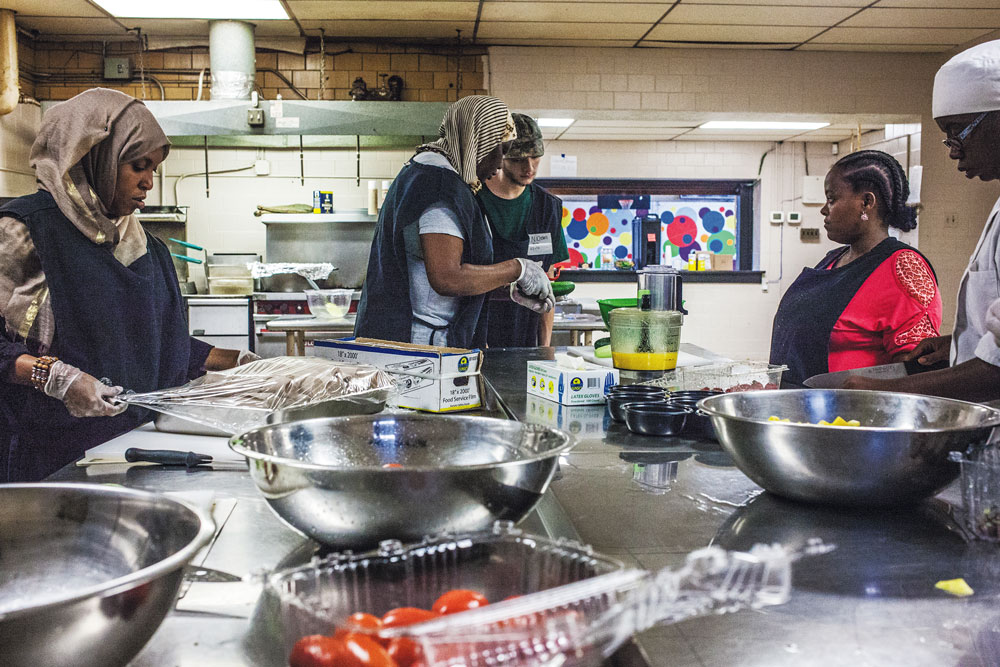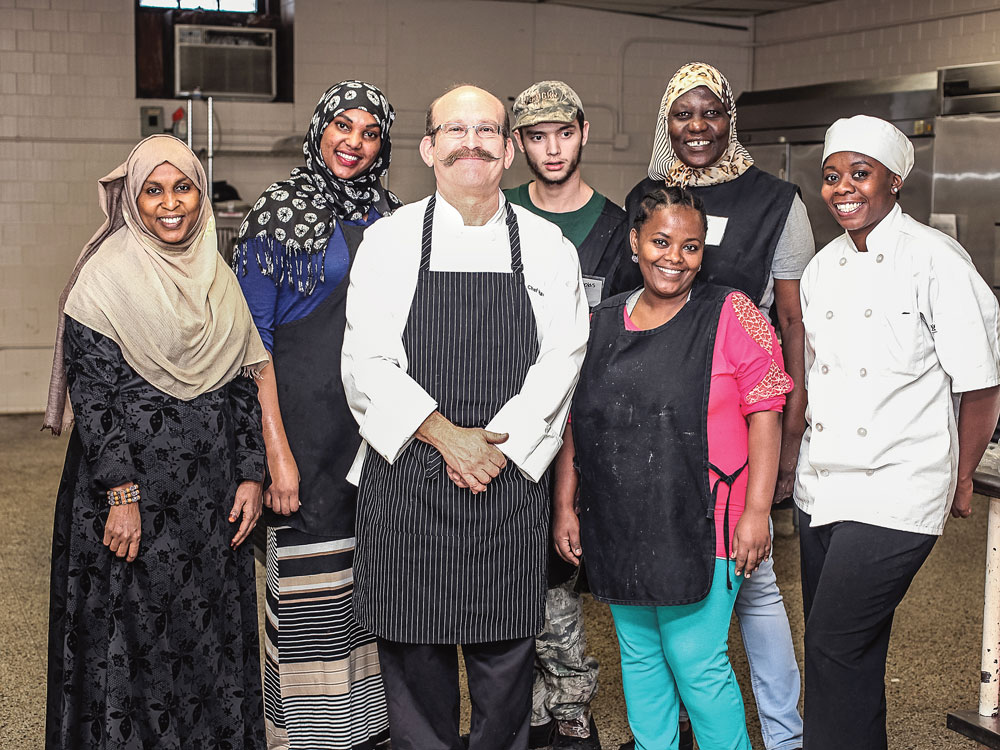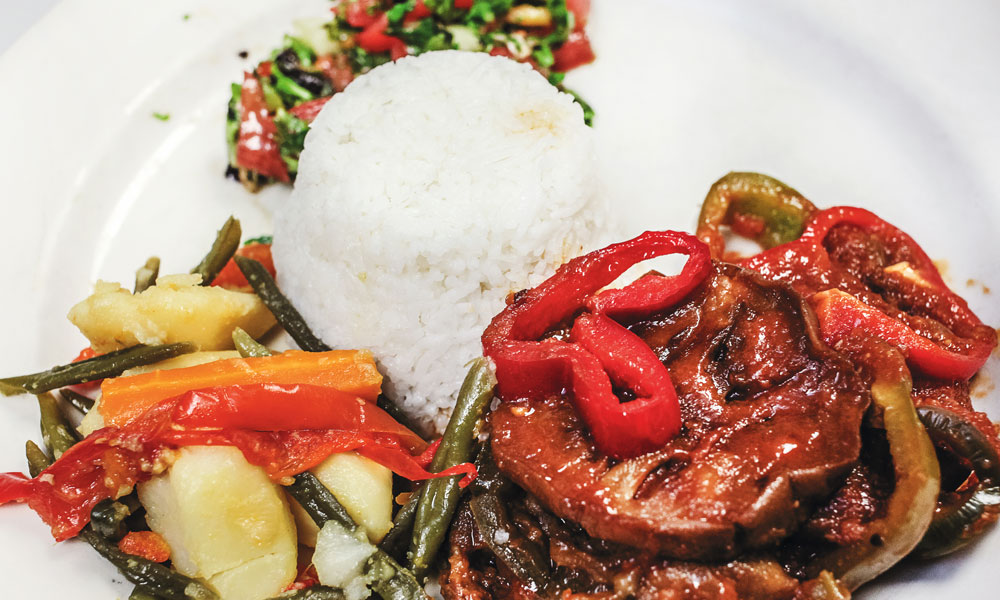Photos by Mickie Winters
Garlic, onion, carrots and ginger sizzle in a skillet the size of a bathroom sink, just the beginnings of an Ethiopian vegetable dish to come. The promise of a good meal strengthens with each inhalation of each ingredient added — fresh green beans, potatoes, another shake of ginger, salt, bell pepper. In the basement of Catholic Charities on West Market Street, in a spacious commercial kitchen of stainless steel and stark white walls, six students enrolled in Catholic Charities’ Common Table culinary program wash, chop, purée, sauté and stir. Not a moment of stillness. Bowls clang as they accidentally hit the floor. Back to the sink for cleaning. Hank Levitt, who teaches the class, looks at the clock: 10:18 a.m. “At 11 we have people coming for lunch,” the longtime chef announces. “We need to focus.”
Thirty-eight-year-old Fatema Mohammed, an Ethiopian refugee wearing jeans and a T-shirt under a black apron, her head wrapped in a striped head scarf, scoops rice from a tall soup pot to see if it’s ready. She has her friend and classmate, Zewdnesh Tolcha, another Ethiopian refugee, taste it. In an Ethiopian dialect, Tolcha tells Mohammed it needs more time.

Fatema Mohammad and Zewdnesh Tolcha put the finishing touches on an eggplant dish.
On a dry-erase calendar near the steaming rice, a note scribbled for the day in black reads: “Fatema is the boss.” Mohammed is in charge of creating and executing the day’s lunch menu that will be served one room over in a snug space made to look like a cafe with hand-me-down booths from the restaurant Captain’s Quarters.
Common Table turned a year old this summer. The nonprofit’s mission: provide refugees (as well as local residents who may lack job skills) with a basic culinary education. Program coordinator Laura Stevens says refugees, particularly women, often have very little or no formal work history. “So when they come here, they have nothing to put on an application,” she says. Upon arrival, each refugee receives a small stipend from the federal government, ranging from $1,125 to $1,325 depending on his or her country of origin. It must cover rent, transportation, food and any other expenses. Then they’re on their own. Refugees are expected to be employed and self-sufficient within 90 days.
Mohammed resettled to Louisville three months ago after 14 years living in Egypt awaiting asylum. She learned to cook “from different places,” she says, adding that her mother is from Ethiopia, her father from Sudan. At the end of this course, she’d like to find work in a kitchen, though she’d jump at any opportunity. (Mohammed speaks five languages, including Arabic and Amharic.) “Every job is good for life,” she says. “Without a job, I cannot live.”
It’s now 10:35. Mohammed darts from pot to pot. Sweat beads on her forehead. She pauses at a sink where a classmate, a 17-year-old from Boys & Girls Haven, stands. “Wash, wash,” she instructs in a gentle tone, handing him a colander full of cucumbers that must be peeled and chopped for a salad. She checks in on Tolcha, who’s pouring a thin, light-brown batter on a griddle for injera, a spongy East African sourdough bread used to sop up sauces.

Students at Common Table
Mohammed and her five classmates are in the fifth week of Common Table’s eight-week, 20-hour-per-week course. It costs $500 but nearly everyone pays the fee by working at Catholic Charities for a few hours here and there. In the last year, 18 students have graduated the program. Some have landed at Mussel and Burger Bar, Queen of Sheba, a nursing home’s kitchen and Brown-Forman’s catering service.
Stevens sees Common Table as a natural extension of Common Earth Gardens, another Catholic Charities program that’s built nine community gardens for more than 200 refugee families to grow and harvest produce. (Common Table tries to use produce from those gardens when possible.) Stevens hopes Common Table can grow and eventually help sustain those gardens, as federal dollars to that program have disappeared. Another reason Stevens created Common Table? Restaurants needed bodies. “We spoke to people in the food-service industry in town and we heard across the board that there was a real need for people who had a basic level of training but hadn’t been to culinary school,” she says.
Mohammed, who is tall and broad-shouldered, bends over a trashcan and hurriedly peels cucumbers, peering up at the clock on the opposite wall. “Do you need me to help you do something?” Levitt, who worked for years in the Seelbach hotel’s baking department, asks. “Get out of my way,” Mohammed replies softly, smiling. Levitt, a short man with a well-groomed handlebar mustache, laughs as he walks away. At this point in the course, Levitt has taught his students all the fundamentals: knife cutting, sanitation, food storage and presentation. Now he supervises — “Sanitation rags must be in the water, folks!” — as they prepare food for a twice-weekly lunch service as well as special catering events.
Standing over a spicy beef dish the students cooked the day before, he scoops excess sauce — a tomato-based concoction spiked with an Ethiopian spice blend called berbere — and nods toward Mohammed. He’s impressed by her ability to delegate and remain calm under pressure. “It’s like she’s been doing it for years,” he says.

A meat dish with injera and rice
For many students, the cooking part isn’t so hard. It’s everything else — learning English, measurements, mastering credit-card swipes and explaining food and flavors. (In addition to ethnic foods students choose to prepare, Common Table has a rotating menu of staples, like chicken curry, chili and lasagna.) “Even for some of the students that we have with really great English skills,” Stevens says, “we really work on that confidence so that they feel comfortable interacting (with customers).”
Just after 11, a group of nearly a dozen professional-looking women step into the cafe. Levitt has Mohammed stand before them and introduce the dishes. “This is injera,” she says, pointing to a bin full of the bread rolled up like tiny yoga mats before moving to the next tray. “This is eggplant. A majority of Ethiopian people eat this with rice.” When she’s done, food is scooped onto plates and Mohammed hustles back to the kitchen. “I’m proud of you,” Alisia Richardson, a cheerful, outgoing fellow student, says to her.
“Everybody together, we did it,” Mohammed replies, smiling. She raises her right arm. “Look,” she says in a near whisper. “Goosebumps."

Culinary instructor Hank Levitt and his students at Common Table
Common Table
2234 W. Market St., 873-2566 ext. 256
Serves lunch Tuesdays and Thursdays, 11:30 a.m. to 1 p.m.
Vegetarian option: $4; meat option: $5
This originally appeared in the November 2016 issue of Louisville Magazine. To subscribe to Louisville Magazine, click here. To find your very own copy of Louisville Magazine, click here.
Cover Image: Vegetarian eggplant dish


